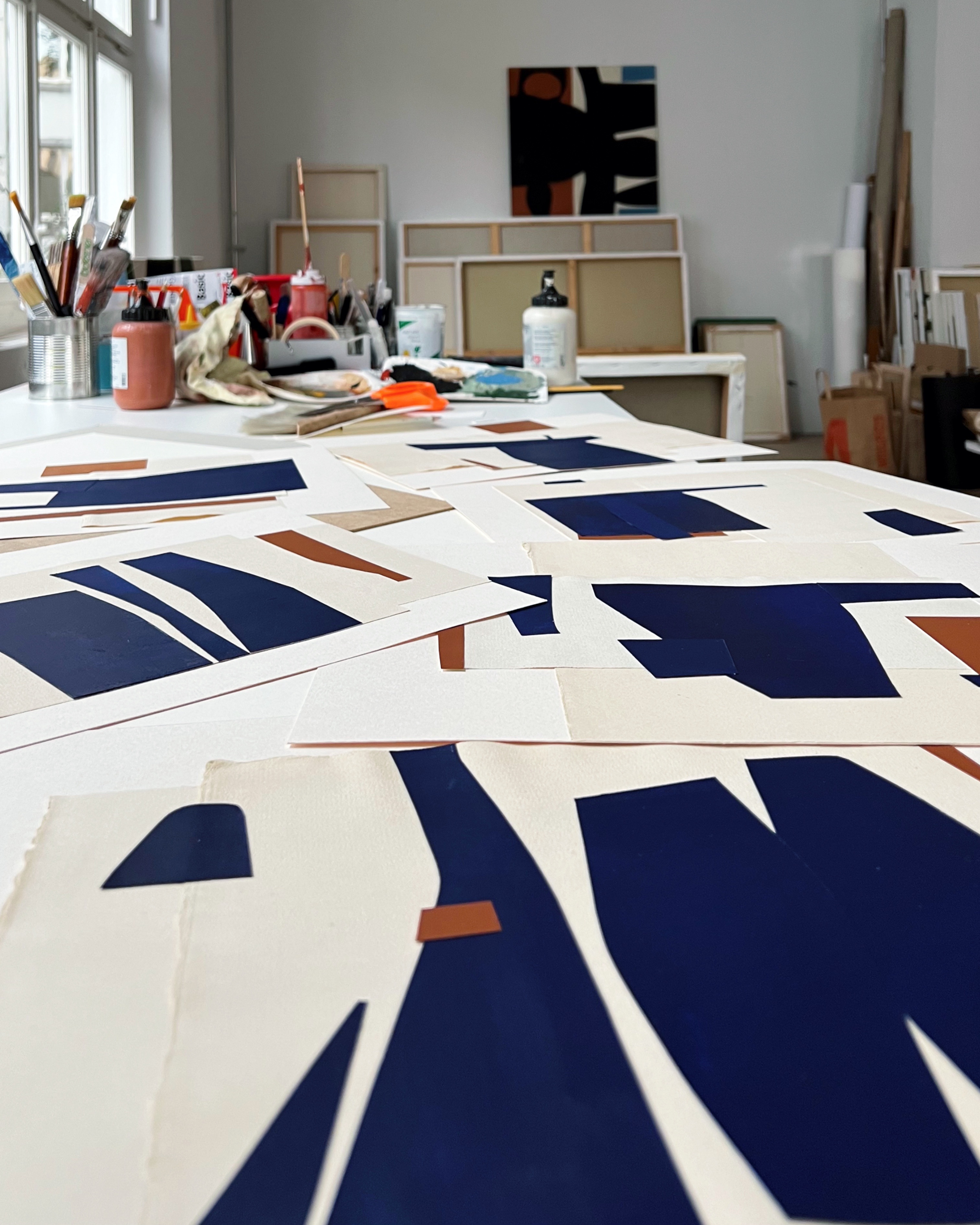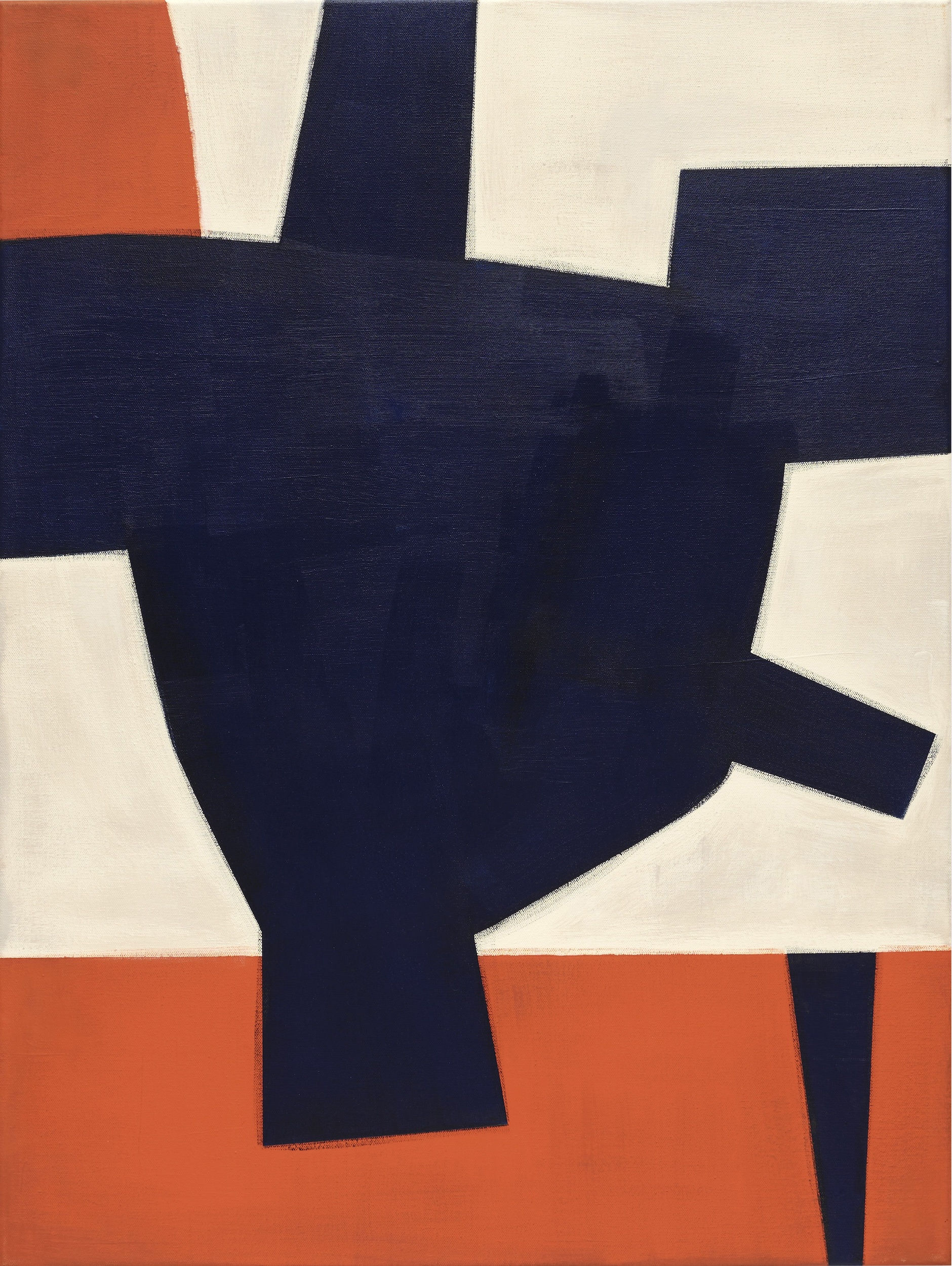
Anne-Marie Fisher at her studio in Zurich, Switzerland. Photo: Andrea Diglas
Swiss artist Anne-Marie Fischer's solo exhibition Blueprints opens at Ronewa on Novemeber 7. We chatted to her about her collaging technique that informs her the bold geometric compositions of her abstract paintings, which viewers will see first hand at Ronewa, alongside her striking paintings. Fischer shared with us her artisitc drive to experiment her way into new discoveries and what she had to unlearn to allow herself to get there.
Read more information about Blueprints and Anne-Marie Fischer.
Read more information about Blueprints and Anne-Marie Fischer.
April Dell: You’ve written that your work has the elementary theme of “figures in space.” How do you create and define the spaces of your abstract art practice?
Anne-Marie Fischer: I explore these spaces by experimenting. Sometimes I start with an idea, but the exciting things only develop while I'm working. I observe what happens between form and space by moving, turning, and mirroring individual pieces. The collage method works very well for this. I search for the right moment in which everything communicates together.

Anne-Marie Fischer, Équilibre (Balance) IX, 2024, Hand-painted paper, mounted on Fabriano paper, 30 x 40 cm, 11 3/4 x 15 3/4 in. Photo: Artist.
AD: What “clicks” when you find the right composition?
AMF: The “click” is the deep feeling that runs through me when a composition surprises me, convinces me. It happens when something new and unexpected has emerged, a response to the energy I put into the work. An intense moment realized visually.
AD: Collage strikes me as a tactile, playful, and imaginative part of your process. How did you develop this technique?
AMF: Collages are my counterpart to models in architecture. So it’s a technique that I bring with me from my previous life as an architect. Collages are very direct and can be easily modified. Sometimes your thoughts are slower than your hands. You watch what happens and you react instinctively. It has a lightness to it, where unintentional things can emerge. This technique helps me to get into undiscovered territories that I would never have reached through painting.


Anne-Marie Fischer in her studio in Zurich. Photo: Andrea Diglas.
AD: The exhibition title ‘Blueprints’ is a nod to your previous career as an architect. In what other ways has your background in architecture informed your art practice?
AMF: On the one hand, there are things that come to me during my work: researching, experimenting, developing, and finalizing a project are the same processes as in architecture. I can immerse myself in my work and concentrate on it intensively. I develop things, but I can also throw them overboard if they’re not working.
On the other hand, I had to break myself free of some habits, such as strong geometries and logical design. Over the years, I have been able to free myself step by step and embrace other components, such as intuition, chance and imprecision. I have now reached a point where I feel the freedom to work in a much larger field.

Anne-Marie Fischer's studio in Zurich. Photo: Andrea Diglas.
AD: You work on multiple scales, from intimate paper works to large canvases to murals. What do you like about playing with scale?
AMF: I'm less interested in the size and scale of a work and much more fascinated by different techniques, how I can realize something well. I love working with different tools, processing different materials with color, various papers, glue, textiles, and structures. You learn by entering unknown terrain. I love combining techniques. I'm not just interested in painting, but in discovering and experiencing new things. I am equally interested in three-dimensional work. I also create sculptural objects that I have never exhibited before.
AD: How do your collages translate into paint on canvas? What transformations occur?
AMF: My collages are studies - studies have always been a method for defining the composition of a painting. I start by fixing precisely placed points so as not to lose the tension of the study. The challenging aspect, however, is the application of the layers of paint, the edges, the transitions between the individual surfaces and colors, the transparency, depth, or matt quality. It takes many steps before everything melts into a whole.

Anne-Marie Fischer, Upside Down I, 2024, Acrylic on canvas, 80 x 60 cm, 31 1/2 x 23 5/8 in.
AD: Looking over your oeuvre, some colors appear again and again, such as deep blue and burnt orange – colors that also dominate the works in your exhibition at Ronewa. What is your connection to these colors?
AMF: Indeed, certain colors appear repeatedly. I don't have a complete color palette, I limit myself. The whole world of color is too big for my work. New colors appear in my paintings as a result of certain events, and then I develop a series to experiment with them. Colors behave differently depending on their surroundings. I like to work with strong contrasts that create tension.
AD: As well as working in your Zurich studio, you have a studio located in a forest. How does nature influence your work?
AMF: Working in my wooden house in the forest is a very particular experience. It’s my contrast program. Here I am surrounded by large chestnut trees. In summer, I only see green leaves, and in winter, a view of black gnarled branches that form figures as if painted by a brush. I find the trees very calming. I can retreat here, go for walks, devote myself to research, and paint at my own pace. The studio is simply equipped, without a computer of course. It is certainly no coincidence that the color green has imposed itself on my color palette since I started working here.
But afterwards, I enjoy Zurich's vibrant life and cultural program again. In Zurich, I have a more structured life. I start painting very early, which is physically demanding. In the afternoon, I take care of admin and everyday things, and I meet with friends. It is certainly the case that where I work has an effect on my work.

Add a comment